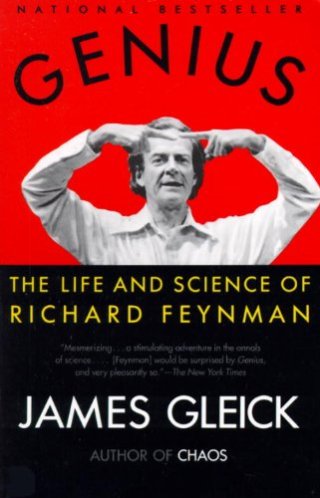Genius Summary

7 min read ⌚
 The Life and Science of Richard Feynman
The Life and Science of Richard Feynman
Do you know who Richard Feynman was? If you do, then you need no reason to read ahead. If not – then you are missing a lot.
Either way, James Gleick’s “Genius” is a prerequisite, “a terrifically readable… jewel-like biography” of one of the greatest and most unconventional scientists in history.
Who Should Read “Genius”? And Why?
Just like Richard Feynman himself, “Genius” is a book which may make you fall in love with science all over again. Everyone who already is will enjoy this book immensely and readily recommend it to others. And there is no better place for the rest to start than “Genius.”
About James Gleick
James Gleick is an American historian of science, considered by many to be “one of the great science writers of all time.”
is an American historian of science, considered by many to be “one of the great science writers of all time.”
He has written eight books, three of which (including “Genius”) have been finalists for “The Pulitzer Prize” and “The National Book Award.”
He is probably most famous for his 1987 classic “Chaos: Making a New Science” and the international bestseller “The Information: A History, a Theory, a Flood.”
“Genius Summary”
Six years before he died, Julian Schwinger – an American Nobel-Prize winning physicist – wrote a little epitaph for a colleague (and, mind you, a former rival) which may seem like an appropriate introduction to our summary:
“An honest man, the outstanding intuitionist of our age, and a prime example of what may lie in store for anyone who dares to follow the beat of a different drum.”
True, it all sounds neat and tidy, but epitaphs are such: of the dead, we should say nothing but good, believed the Romans. However, in this case, the epitaph may be more interesting not because of what is inside it, but of what is not.
You may understand what we’re thinking better if we finally reveal to you the name of this mystery person: Richard Feynman, an American genius, scientist extraordinaire, and a guy whose list of memorable quotes is longer than a day on Venus. Oh and – dare we forget? – one of the two other guys who shared the Nobel Prize in Physics with Schwinger in 1965.
So, why did Schwinger decide to use the word “intuitionist” instead of “theoretical physicist” and speak of Feynman’s integrity and unconventionality instead of his scientific achievements?
Well, if taken as rhetorical, the question may give you the answer right away. However, we intend to build a little upon it, by sharing with you some interesting tidbits from Feynman’s biography as depicted in James Gleick’s brilliant biography, succinctly and fittingly titled “Genius.”
Richard Feynman was born on May 11, 1918, the son of Lithuanian Jews. His father, Melville, had scientific aspirations himself, but due to his ethnicity, he gave up on that dream and ended up working as a salesman. However, he kept the dream alive when it came to his child: if I ever have a son, he once prophesized, he will become a scientist.
Well, Feynman didn’t get off to a great start. He hadn’t uttered a single word during the first three years of his life. Though, that may have been a sign in itself – after all, Einstein was a late talker as well.
Among many others, Feynman shared another important trait with Einstein: he was capable of visualizing things pretty easily. And, retrospectively, it was probably all his father’s fault: he always explained to him things in a matter which made complex ideas seem simple. Feynman has been now remembered by many for this capability.
He exemplified this best during his high school years when he was able to solve serious mathematical problems without using a single formula. He just visualized himself in the midst of the conundrum – and, suddenly, he knew more about it than anyone else.
When the time for college came, Feynman turned his attention from math to physics. At this point, the first grew a bit too abstract to his taste; the latter was all but the perfect field for some with his understanding of equation and visualization capabilities.
Unsurprisingly, at MIT, he excelled in this new discipline. Though, to be perfectly frank, that’s where his excellence began and ended. Because you see, Feynman didn’t care too much for the social sciences. He hated art history and English and loathed music and philosophy.
So, he did what 90% of you have done at some point in their education: he cheated. And he cheated really bad.
So bad, in fact, that when he applied for a Princeton scholarship, he was nearly rejected, even though he attained a perfect score on the graduate school entrance exams in physics. Needless to add – this was an unprecedented feat, which means that nobody between 1746 and 1939 had done it.
Feynman was that good.
And, cheating aside, he got that Princeton scholarship – on the condition that he would not marry until obtaining a Ph.D. And he didn’t, though he was already engaged and living one of the greatest love stories of the 20th century.
Be warned: your room may get dusty and your eyes a little wet in a second.
You see, ever since his days at New York City’s Far Rockaway High School, Feynman had been in love with Arline Greenbaum. His high school sweetheart, however, was a poor girl, so she had to give – ah, the irony! ah, the power of love! – piano lessons during the day and art instructions at night to earn enough money. This wore her out, so she started feeling a bit sick at the time Feynman was acing his Princeton entrance exams.
After a series of incompetent diagnoses, it was discovered that Arline had lymphatic tuberculosis – when it was already too late. Even though Feynman’s parents bitterly protested, Richard married Arline just after obtaining his Ph.D.
In the meantime, he was recruited to work on the Manhattan Project, so he took Arline to a sanatorium in Albuquerque to be close to her and be able to visit her every weekend using the car of Klaus Fuchs (yes, the guy who later turned out to have been an infiltrated Soviet spy).
Just two months before the United States dropped the nuclear bombs on Japan, Arline died. One and a half years later, after his father Melville left the world as well, Feynman wrote Arline a letter which is kind of difficult to read without wet eyes. “You only are left to me. You are real. My darling wife, I do adore you. I love my wife. My wife is dead.”
“Please excuse my not mailing this,” he added in the postscript with a recognizable doze of humor, “but I don’t know your new address.” The letter would remain sealed from 1947 until Feynman’s death in 1988.
In-between, Feynman would become a legendary professor, a joker, and a Nobel Prize winner. Supposedly, when the press awakened him at 3:45 AM with the news, and asked him how he felt about winning the prize, he quipped: “Well, I could have found out later this morning…”
And that event sums up brilliantly the life of a man as exceptional as any. As Freeman Dyson said, Feynman was “half genius and half buffoon” who kept “all physicists and their children amused with his effervescent vitality.”
Three decades after his death, he is still an inspiration to many.
A genius of the highest rank.
Key Lessons from “Genius”
1. Know How to Solve Every Problem That Has Been Solved
2. Know What You’re Bad at and Don’t Bother with It
3. Always Find Some Time for Clowning
Know How to Solve Every Problem That Has Been Solved
Richard Feynman died on February 15, 1988. At the time of his death, this is how his blackboard looked like. If you’re having trouble reading it, it says two things: “What I cannot create, I do not understand” and “Know how to solve every problem that has been solved.”
Whether you’re an artist or a scientist, reverse engineering is a powerful tool. And there you have it – as the last lesson from one of history’s greatest professors.
Know What You’re Bad at and Don’t Bother with It
Now, this may sound strange coming from a person who taught himself to play drums and draw satisfactory sketches of nudes, even though he didn’t like music or art.
However, he did both of these things at a later stage, and, even though he once bet Arline that he would learn to play “The Flight of the Bumblebee,” he ended up failing dismally. The point is: Feynman was a genius at math, but genius is not transferable. In other words, he could allow himself to fail in so many different fields.
Because that was the only way he could excel in the one that really mattered.
Always Find Some Time for Clowning
Freeman Dyson, an English-born American physicist, was five years junior to Richard Feynman and a life-long friend of his.
In 2005, he wrote for “The New York Review of Books” an article which tried pinpointing the reason because of which Feynman became a public icon, “standing with Albert Einstein and Stephen Hawking as the Holy Trinity of twentieth-century physics.”
His answer?
“Einstein, Hawking, and Feynman shared an ability to break through the barriers that separated them from ordinary people. The public responded to them because they were regular guys, jokers as well as geniuses.”
Like this summary? We’d like to invite you to download our free 12 min app, for more amazing summaries and audiobooks.
“Genius” Quotes
Maybe that’s why young people make success. They don’t know enough. Because when you know enough it’s obvious that every idea that you have is no good. Share on X I was born not knowing and have only had a little time to change that here and there. (via Richard Feynman) Share on X The spirit of Edison, not Einstein, still governed their image of the scientist. Perspiration, not inspiration. Mathematics was unfathomable and unreliable. Share on X Feynman resented the polished myths of most scientific history, submerging the false steps and halting uncertainties under a surface of orderly intellectual progress, but he created a myth of his own. Share on X The adult Feynman asked: If all scientific knowledge were lost in a cataclysm, what single statement would preserve the most information for the next generations of creatures? Share on XOur Critical Review
Come on, it’s Richard Feynman!
The guy has written quite possibly the best autobiography (being a collection of anecdotes) by a scientist ever written. And it has the best title too: “Surely You’re a Joking, Mr. Feynman!”
Now, why would I need to read a biography?
That in itself may be one of the reasons. Another may be that James Gleick is one of the best science writers in history. And a third one that “Genius” is the biography Richard Feynman deserves.
As Amazon’s review states concisely: “a book you must read.” We emphasized the must.








